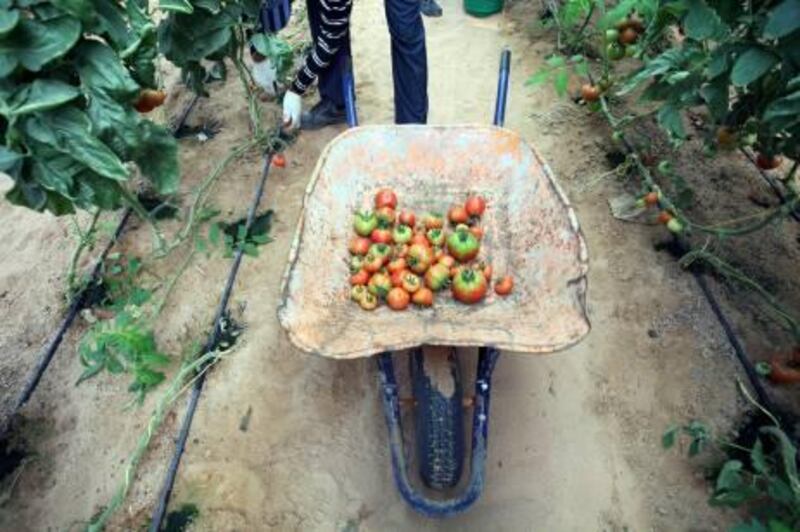ABU DHABI // Food manufacturers and government officials from across the region will meet in Jordan today to explore ways they can work together to secure food supplies.
The major players in government and business have been spurred on by sharp price rises in recent months, the result of poor harvests in several big producing countries including Russia and Pakistan, as well as stockpiling by large countries such as China and India, and trade barriers.
The Gulf remains vulnerable to volatile food prices. About 90 per cent of its food - up to 85 per cent in the UAE's case - is imported.
However, the Middle East and North Africa (Mena) region's nations can play an important role in providing the supplies needed by combining forces, experts say.
The Arab Food Industries and Franchising Forum today and tomorrow comes at a particularly volatile time in the region. Protesters in Tunisia, Egypt, Jordan, Yemen and Oman have taken to the streets, and soaring food prices coupled to the cost of living are high on their agendas as their governments struggle to respond to these grass-roots problems.
The Minister of Economy, Sultan al Mansouri, will be speaking during the forum about the challenges the food industry faces, and what role it can play in boosting food security.
Mr al Mansouri will be joined by ministers from Yemen, Saudi Arabia, Jordan, the Palestinian Authority, Mauritania and Sudan as well as representatives from the Arab League, the United Nations Industrial Development Organisation and the World Bank.
"It was catastrophic this year," said Dr Hayssam Jaffan, the president of the Arab Federation for Food Industries, a speaker at the forum being held at the King Hussein bin Talal Convention Centre at the Dead Sea.
"Governments have to implement new rules and provide aid to their people to minimise the gap between cost of living and salaries."
Dr Jaffan said Middle Eastern food manufacturers needed to focus on production and work together. To do this, they must be strategic about what they produce and what resources are consumed.
"What the food industry sector can do is try to close the gate [between demand and supply] by manufacturing the right food," Dr Jaffan said.
Agriculture contributes to 12 per cent of the Mena economy, yet uses 89 per cent of the water. The UAE has the highest per capita water consumption in the world, at 550 litres per person per day. As resources dwindle, experts say the region needs to develop a sustainable approach to food production.
To that end, regional leaders are also exploring the possibility of reducing competition between countries by asking factories to make country-specific products. Egypt, for example, which grows a lot of tomatoes, could be designated the regional producer of tomato paste.
However, the marketing director of a food trading group who did not wish to be named said this was unlikely to work. "In this market, there is no control on pricing," he said. "It's all luck."
But that luck may be running out. Dr Jaffan said many food manufacturers operated without enough of a margin to sustain themselves.
Sven Mostegl, a food consultant in Dubai, agreed that combining forces would save resources and boost production, but he said it was likely to be hindered by individual nations' drive for profits.
If one country's industry became more profitable, there would be discord, he said, adding that the plan could also damage the environment if not carefully managed.
"Soil will become depleted in the long term, and in 20 or 30 years the problem will be much bigger," he said.
Leaders at this week's forum are also expected to implement resolutions passed at the annual Arab Economic Summit in Sharm el Sheikh on January 19, Dr Jaffan said. During that summit, Arab League members pledged US$2bn (Dh 7.34bn) towards job creation and economic development.
The fund was first proposed at the 2009 summit in Kuwait, and is one of a raft of measures taken by governments to ease the burden of food price rises on their citizens.
Last month, the Kuwaiti government announced that it would give its 1.1 million citizens 1,000 Kuwaiti dinars (Dh13,000) each, as well as an estimated 250 million dinars in food subsidies.
The Jordanian government also unveiled a 300 million Jordanian dinar (Dh1.55bn) package to create jobs and ease the rising cost of living, along with no new taxes.
Main aims of the conference
• Identify and address issues that limit food production, processing, packaging and distribution
• Highlight the importance of food franchising and encourage meetings between franchisers and franchisees for potential deals
• Improve relationships between food-related government agencies representing the countries involved
Spot food safety issues and highlight new food safety management techniques
Type of sectors represented at the conference
• Cattle farming
• Agricultural fertilizer and chemical production
• Banking and investment
• Fish farming
• Irrigation
• Shipping and logistics
• Franchising
Food processing
See also:






